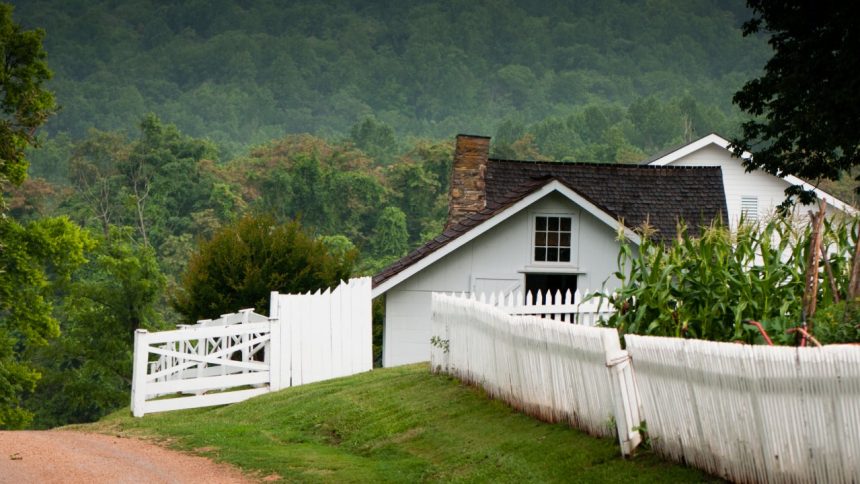Montes-Bradley/Getty Images
Thinking about moving to the Old Dominion State? You’re not alone. According to U.S. Census Bureau numbers, Virginia is home to more than 8.6 million people. Predicting home affordability in this Mid-Atlantic state isn’t easy, though — prices can vary wildly depending on where in the state you’re looking, especially on the beaches or in the suburbs of Washington, D.C. To gain a clearer picture of the cost to buy a house in Virginia, as well as strategies to make your transition more affordable, continue reading.
How much is a house in Virginia?
The median sale price for a home in the state was $472,800 in June 2024, according to Redfin data. But be sure to consider the local market in the town you’re looking in as well as the overall state one. For example, the median price in Arlington, just across the Potomac River from D.C., is considerably higher at $796,250. And in Roanoke, the median is much more affordable at just $245,000. The overall cost of living in each city is considerably different, too.
It’s also important to know how these price fluctuations affect monthly mortgage payments. For example, Bankrate’s mortgage calculator shows that, with a 30-year loan at a 6.8 percent interest rate and a 20 percent down payment, the principal and interest payments for a median-priced home in Arlington would be $4,153 per month. Applying the same criteria to a median-priced home in Roanoke would result in a monthly principal and interest payment of $1,278.
Down payment
If you are able to, making a larger down payment upfront will reduce your monthly expenses over time. Although a full 20 percent down payment is not mandatory, reaching this amount will help you avoid having to pay for private mortgage insurance. Here are the minimum down payment requirements for some common mortgage programs, for qualified borrowers:
- Conventional loans: 3 percent
- FHA loans: 3.5 percent (for credit scores of 580 or higher), 10 percent (for credit scores between 500 and 579)
- VA loans: No down payment if you qualify
- USDA loans: No down payment if you qualify
Saving for a down payment can be very challenging — after all, 20 percent down on a median-priced Virginia home of $472,800 comes to $94,560, much more than many people have in their bank accounts. But there are resources available to help you cover the upfront costs, especially if you’re buying your first home. In addition to statewide assistance programs, many cities and municipalities offer local help. Ask your agent to help figure out if you’re eligible for any of these programs.
Closing costs
Virginia closing costs are on the high side, averaging 1.7 percent of a home’s sale price (not including agent commissions), according to CoreLogic data. For a median-priced $472,800 Virginia home, 1.7 percent comes to just over $8,000 — but that entire cost is not borne by the buyer; the seller pays some of it as well.
Closing costs for Virginia buyers will likely be mostly related to the mortgage loan, including lender charges for the application, credit check, loan origination and more. There will also be fees for a home appraisal and inspection. It’s a good idea to salt away some extra funds in your bank account for routine maintenance and unexpected emergencies, too.
Cost to move
Don’t forget to account for moving costs when you’re budgeting for you home purchase. The cost will vary based on how many items you have and how far you’re going, among other factors. According to moveBuddha, the average cost for pro movers in Virginia can range between $457 and $3,825 — and if you’re moving long-distance, it can cost much more.
Homeownership costs
Every new home will also come with the continuous costs associated with ownership, upkeep and maintenance. The insurance company State Farm advises homeowners to set aside 1 to 4 percent of their home’s value annually for maintenance expenses. For a median-priced $472,800 home in Virginia, this means allocating up to $18,912 each year to maintain your property. Here are a few key costs to budget for:
- Property taxes: These differ widely by state, and Virginia has a property tax rate rate of 0.76 percent. That’s higher than neighboring states West Virginia and North Carolina, but slightly lower than Maryland.
- Homeowners insurance: On average, the annual home insurance cost for $300,000 in dwelling coverage in Virginia is $1,545 — considerably below the national average of $2,270.
- HOA fees: If your property is part of a homeowners association, you’ll need to budget for HOA fees as well, which can vary significantly based on the amenities and services offered by the community.
Reducing costs to buy a house
To lower the costs related to your home purchase, try these tips:
- Keep an eye on mortgage rates: Waiting for rates to decrease could result in substantial savings (thought there’s no guarantee that they will). In addition, a higher credit score will get you a better rate, so if your score is less than ideal, spend some time paying down your debt to bring it up.
- Consider a smaller property: Condos and townhouses typically have lower price tags than single-family homes, so think about how much space you really need. A condo can get you started on your homeonwership journey, even if it’s not your forever home.
- Expand your search location: Big cities and hot neighborhoods cost more — looking close to your desired area, rather than right in it, can save you money.
- Ask for seller concessions: Sellers are often willing to shoulder some of the buyer’s costs in the name of keeping things moving smoothly. Requesting help with repairs or closing costs couldn’t hurt.
Next steps
If you’re ready to buy a house in Virginia, don’t go it alone — the process will be easier with guidance from a seasoned local real estate agent. A skilled agent who knows your local market well can help find you a home that fits your budget and meets your family’s requirements, as well as managing paperwork and navigating any obstacles that may arise.
FAQs
-
The median price for a home in Virginia as of June 2024 was $478,200, according to Redfin data. However, home prices can fluctuate widely depending on where in the state you’re looking, and prices tend to be higher in the suburbs closest to Washington , D.C.
-
Virginia’s closing costs average around 1.7 percent of the home’s sale price (not including Realtor fees), according to data from CoreLogic. On a median-priced $478,200 home, that comes to a bit more than $8,000 — however, that amount is split between the buyer and the seller, so you don’t have to shoulder it alone.
Read the full article here















